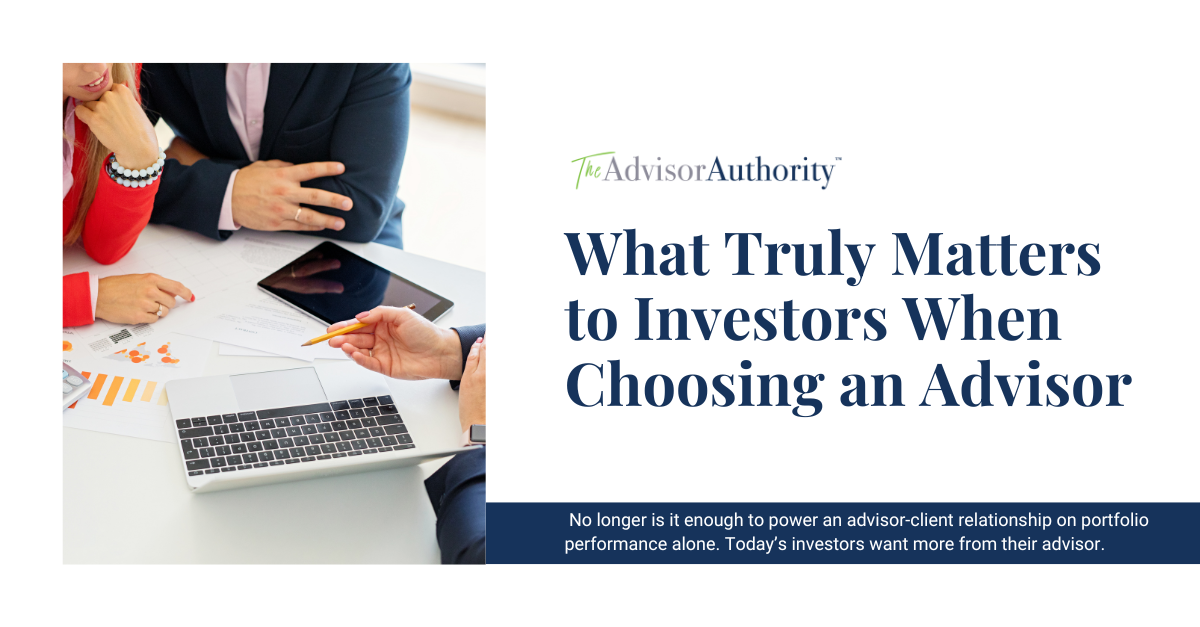
September 2024 | The Advisor Authority Team
Today’s investors have more options than ever when it comes to managing their portfolios. From self-directed accounts to robo-advisors, intuitive trading platforms, and AI-assisted software, there’s no lack of opportunity for investors to DIY their investments. Because of the widening access to financial tools and resources, investor expectations are evolving when it comes to their relationship with advisors. No longer is it enough to power an advisor-client relationship on portfolio performance alone. Today’s investors want more from their advisor. So what, exactly, are prospects and future clients most focused on when it comes to choosing an advisor? Here is what truly matters to investors when choosing an advisor (beyond portfolio performance).
#1: Goal-Based Planning
People want their money to help them accomplish certain milestones—meaning money isn’t the goal itself, but rather the tool used to achieve it. When they come to you, they’re looking for guidance on how to get from point A (where they are today) to point B (retirement, home buying, paying for college, etc.) in the most effective way possible.
Beyond earning the highest returns possible, your future clients are looking for an advisor who will take into consideration their unique goals and develop a personalized plan to accomplish them. Plus, they want someone who will walk through their financial journey with them, ready to make adjustments as their needs evolve.
#2: Expertise
There’s a reason so many advisors find success in identifying and targeting a specific niche. People want to work with professionals who understand their unique circumstances, whether it’s navigating equity compensation, managing military benefits, transferring a multi-generational business, or working in a specific industry or field.
Not only do clients want to know you can handle their specific pain points, but they also need to know you’re an experienced and educated professional. Many people opt to obtain professional certifications, such as the CERTIFIED FINANCIAL PLANNER® designation, to help demonstrate their credibility and commitment to continued training. Third-party certifications and designations help provide more legitimacy, which can be a differentiating factor when investors are choosing.
#3: Trust
More than anything else, your future clients need to feel that they can trust you with their wealth. Trust that deep must be earned and nurtured leading up to and all throughout your entire advisor-client relationship.
There’s no limit to the number of ways you can work to build trust with potential clients, but find what works for you and incorporate them intentionally into your day-to-day operations.
Some common ways to build trust with prospective clients include:
- Share resources and educational materials on social media
- Communicate proactively and be responsive
- Have a clean and cohesive digital footprint (including your website, social profiles, Google Business page, etc.)
- Be a good, active listener during meetings
#4: Communicate Clearly
People seek out your services to make their financial world feel a little simpler. Yet, some advisors are tempted to make themselves sound smarter or more well-educated by using complicated and unnecessary jargon. Rather than ease your prospects’ anxieties, speaking above their heads only makes them feel less comfortable trusting you with their financial well-being.
Always try to make the complex more simple when speaking with prospective clients, and educate them on certain topics they may not be familiar with.
At the same time, it’s critical to show your prospects you care by demonstrating your communication skills. Answer questions promptly, be proactive when possible, and keep your messaging clear and simple
#5: Be Comprehensive
You have an opportunity to help investors bring all aspects of their wealth under one roof—that’s something no robo-advisor can do. The higher an investor’s net worth, the more complex their financial landscape becomes—and the more critical it is to have a professional coordinating all the pieces. When you’re able to take the responsibility of managing multiple professionals off someone’s plate, your value increases immensely for busy investors.
Plus, having a bird’s eye view of every angle enables you to better identify new opportunities or proactively mitigate certain risks.
Standing Out From the Crowd
The financial services space is evolving, are you prepared to change with it?
As the competition grows stronger, it’s going to take more than portfolio management to attract the next generation of high-net-worth investors. In the Elite Advisor Program, you’ll learn how to land qualified leads and close prospective clients on the first meeting.
This program is built to give you all the pieces you need to build the business of your dreams. From developing your dream team to integrating proven processes into your day-to-day operations and setting your business up to run like a well-oiled machine, the Elite Advisor Program has everything an advisor needs to push past the growth plateau in just six months.

